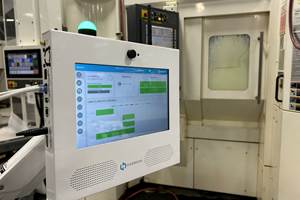The Goal is Jobs
TechWorks provides a rapid way into skilled manufacturing work. Could this program offer a model for how to expand the manufacturing talent pool in your region?
Here is the disconnect we’re all familiar with: While unemployment remains high and long-term unemployment is at heartbreaking levels, manufacturers still struggle to fill open positions, unable to find candidates with the skills they need. This so-called “skills gap” might be frustrating for employers, but imagine how it appears to the unemployed. What are these skills they keep hearing about, and how does one obtain them? There is no apparent way across this divide. To the unemployed, the skills gap looks like a moat.
But Rockford, Illinois, has an intriguing answer. TechWorks, a small program serving this region’s manufacturing community, offers what might be the most logical and effective response I’ve encountered to the disconnect described above. Part of a non-profit business incubator called Eigerlab, this program provides fast-track training into skilled employment in CNC machining. In short, this program offers a bridge over the gap.
To understand TechWorks, it helps to understand what the program is not. It’s not a community college. It is not accredited the way a college is, and it moves at speeds far different from college instruction. In just six weeks, the program provides a student with CNC machine operator training credentialed by the National Institute for Metalworking Skills (NIMS).
The program also is not an alternative to community college. While many who complete the program seek immediate employment, others build on their instruction by attending nearby Rock Valley College.
Finally, the program is not unemployment assistance. Students pay for the training. The fee is $2,800, payable in a series of installments. Prospective students also must apply to the program and win acceptance.
Perhaps the most striking feature of TechWorks is the way its administrators measure success. The goal is jobs, they say. The program aims to meet manufacturers’ needs with qualified employees, and it aims to get students across the skills gap by preparing them for paying employment. TechWorks Executive Director Dan Cataldi says success at these aims partly depends on factors outside the control of either TechWorks or the students, because the amount of manufacturing hiring in the area is subject to dips. He sees this when graduates of the program go too long (more than 90 days) without finding work. During periods when too many graduates have been in this predicament, he has suspended the program until the surplus of unemployed graduates clears. Again, success is measured in jobs, not graduates. He says everyone entering the program ought to have a credible expectation of finding employment on the other side of the training.
High Standards
The skills gap actually relates to far more than manufacturing knowledge, says Mr. Cataldi. When he first began evaluating prospective students, he directly experienced the challenge that manufacturing employers face in trying to hire for entry-level positions. Applicants to TechWorks are screened through a process that includes basic math and reading tests, plus drug testing and an interview to assess interpersonal skills. Early on, the portion of applicants able to pass just this much screening was so low it was “depressing,” he says. Since then, he says TechWorks has developed a local reputation for high acceptance standards, so fewer unqualified prospects apply.
Eight students are accepted into each six-week course. Week one of instruction involves little in the way of manufacturing technology. The focus instead is on the work environment, including the importance of attentiveness and consistency in manufacturing, along with punctuality. Job search and interviewing skills are part of this first week as well. For some students, this teaching is the vital foundation that still has to be placed before they can obtain and keep a skilled job. Then, instruction in topics such as shop math, blueprint reading, CNC machining, and metrology all commence in the second week. At the end of the course, students test to obtain NIMS credentials in two areas: CNC Machining and Measurement, Material & Safety. While their knowledge is not advanced at this point, students are sufficiently prepared to enter the field and begin advancing within it—and just this much is significant.
Indeed, the extent of employer engagement with TechWorks reflects the value local companies place on having this pipeline of prospective talent. Fastenal, which has a facility near Rockford, donated a Doosan Lynx 220L CNC lathe to the program, with cutting tool maker Sandvik Coromant adding tooling for both this machine and a new machining center that was funded in part by the local county. The advisory board for TechWorks, consisting of around 50 companies and growing, has become the largest manufacturing organization in the county, Mr. Cataldi says. This last detail provides a clue to how a program like TechWorks might be replicated elsewhere.
Copy This Idea?
I don’t know whether the TechWorks program is unique. It is at least unusual—though perhaps it shouldn’t be. Programs like this could provide a steady source of prospective employees in any city or region that has a sizable number of manufacturing facilities in need of staffing. If your own facility is located in a region such as this, and if your company is part of an association or network of manufacturers in that area, then consider whether your association might have the leadership and resources necessary to found a fast-track training program along these same lines.
The staffing needed is small. Instructors, administrators and a business development manager comprise a total staff of six at TechWorks, not all of whom work for the program full-time. The equipment would have to be modern, but donations from larger manufacturers and/or grants from local government might provide for some of this. Beyond this investment, the requirement that students pay for training can enable the program to cover a large portion of its costs while ensuring that only serious students receive the training. Given enough supporting organizations, the commitment from each organization could amount to a small price to pay for the benefit of maintaining a viable local talent pool.
There is also the benefit to individual lives, which is an additional outcome that shouldn’t go unremarked. For the Rockford area’s Witold Jemiolo, the day he lost his job in retail was unquestionably a bad one, and the ensuing struggle to find a new job was worrisome. This struggle does not always work out well—the nation’s high long-term unemployment rate attests to this. But it did work out for him. After completing the TechWorks program, he was hired by Fastenal, a company whose expanding manufacturing operations in the area offered clear opportunities for advancement. Not only did Mr. Jemiolo find a new job to replace his old one, it seems likely that he has also found a career.
Related Content
Workholding Fixtures Save Over 4,500 Hours of Labor Annually
All World Machinery Supply designs each fixture to minimize the number of operations, resulting in reduced handling and idle spindle time.
Read MoreAddressing the Manufacturing Labor Shortage Needs to Start Here
Student-run businesses focused on technical training for the trades are taking root across the U.S. Can we — should we — leverage their regional successes into a nationwide platform?
Read MoreHow I Made It: Amy Skrzypczak, CNC Machinist, Westminster Tool
At just 28 years old, Amy Skrzypczak is already logging her ninth year as a CNC machinist. While during high school Skrzypczak may not have guessed that she’d soon be running an electrical discharge machining (EDM) department, after attending her local community college she found a home among the “misfits” at Westminster Tool. Today, she oversees the company’s wire EDM operations and feels grateful to have avoided more well-worn career paths.
Read MoreCan Connecting ERP to Machine Tool Monitoring Address the Workforce Challenge?
It can if RFID tags are added. Here is how this startup sees a local Internet of Things aiding CNC machine shops.
Read MoreRead Next
Registration Now Open for the Precision Machining Technology Show (PMTS) 2025
The precision machining industry’s premier event returns to Cleveland, OH, April 1-3.
Read MoreRego-Fix’s Center for Machining Excellence Promotes Collaboration
The new space includes a showroom, office spaces and an auditorium that will enhance its work with its technical partners.
Read More5 Rules of Thumb for Buying CNC Machine Tools
Use these tips to carefully plan your machine tool purchases and to avoid regretting your decision later.
Read More

















.jpg;maxWidth=300;quality=90)









